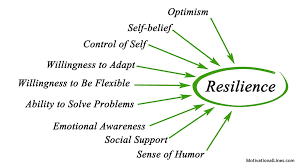Resilience is the ability to cope with and recover from setbacks. People who remain calm in the face of disaster have resilience.
A resilient person is someone who has strong coping skills and is able to marshal their available resources, ask for help when needed, and find ways to manage the situation they are facing. People with psychological resilience are able to use their skills and strengths to respond to life’s challenges, which can include those related to:
- Death of a loved one
- Divorce
- Financial issues
- Illness
- Job loss
- Medical emergencies
- Natural disasters
Instead of falling into despair or hiding from issues by using unhealthy coping strategies, resilient people face life’s difficulties head-on.
People with resilience do not experience less distress, grief, or anxiety than other people do. Instead, they use healthy coping skills to handle such difficulties in ways that foster strength and growth, often emerging stronger than they were before.
This article discusses the signs, types, and causes of resilience. It also covers some of the strategies that people can use to become more resilient.
Signs of Resilience
Resilient people often have a number of different characteristics that help them weather life’s challenges. Some of the signs of resilience include:
- A survivor mentality: When people are resilient, they view themselves as survivors. They know that even when things are difficult, they can keep going until they make it through.
- Effective emotional regulation: Resilience is marked by an ability to manage emotions in the face of stress. This doesn’t mean that resilient people don’t experience strong emotions such as anger, sadness, or fear. It means that they recognize those feelings are temporary and can be managed until they pass.
- Feeling in control: Resilient people tend to have a strong internal locus of control and feel that their actions can play a part in determining the outcome of events.
- Problem-solving skills: When problems arise, resilient people look at the situation rationally and try to come up with solutions that will make a difference.
- Self-compassion: Another sign of resilience is showing self-acceptance and self-compassion. Resilient people treat themselves with kindness, especially when things are hard.
- Social support: Having a solid network of supportive people is another sign of resilience. Resilient people recognize the importance of support and knowing when they need to ask for help.
Types of Resilience
Resilience represents an ability to handle life’s setbacks and is an overall representation of adaptability. However, there are also different types of resilience, each of which can influence a person’s ability to cope with various forms of stress.
Physical Resilience
Physical resilience refers to how the body deals with change and recovers from physical demands, illnesses, and injuries. Research suggests that this type of resilience plays an important role in health. It affects how people age as well as how they respond and recover from physical stress and medical issues.
Physical resilience is something that people can improve—to a certain extent—by making healthy lifestyle choices. Getting enough sleep, eating a nutritious diet, and engaging in regular exercise are just a few ways to strengthen this type of resilience.
Mental Resilience
Mental resilience refers to a person’s ability to adapt to change and uncertainty. People who possess this type of resilience are flexible and calm during times of crisis. They use mental strength to solve problems, move forward, and remain hopeful even when they are facing setbacks.
Emotional Resilience
Emotional resilience involves being able to regulate emotions during times of stress. Resilient people are aware of their emotional reactions and tend to be in touch with their inner life. Because of this, they are also able to calm their mind and manage their emotions when they are dealing with negative experiences.
This type of resilience also helps people maintain a sense of optimism when times are tough. Because they are emotionally resilient, they understand that adversity and difficult emotions won’t last forever.
Social Resilience
Social resilience, which may also be called community resilience, involves the ability of groups to recover from difficult situations. It involves people connecting with others and working together to solve problems that affect people both individually and collectively.
Aspects of social resilience include coming together after disasters, supporting each other socially, becoming aware of the risks that the community faces, and building a sense of community. Such responses can be important during challenges such as natural disasters that affect communities or large groups of people.
Causes of Resilience
Some people are naturally resilient, with personality traits that help them remain unflappable in the face of challenge. However, these behaviors are not just inborn traits found in a select few. Resilience is the result of a complex series of internal and external characteristics, including genetics, physical fitness, mental health, and environment.
Social support is another critical variable that contributes to resilience. Mentally strong people tend to have the support of family and friends to help bolster them up in times of trouble.
Resilient people also tend to have characteristics like:
- Being a good communicator
- Having an internal locus of control
- Having high emotional intelligence and managing emotions effectively
- Holding positive views of themselves and their abilities
- Possessing the capacity to make realistic plans and stick to them
- Viewing themselves as fighters rather than victims of circumstance



